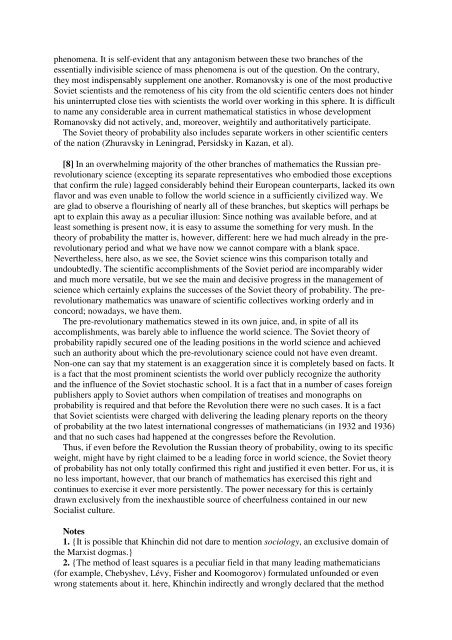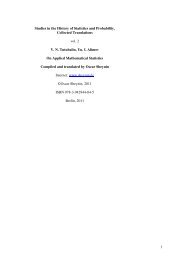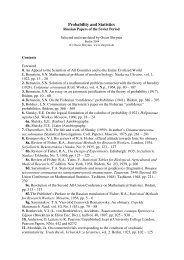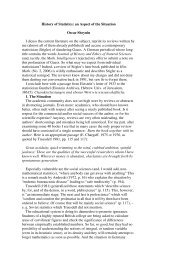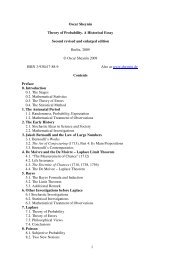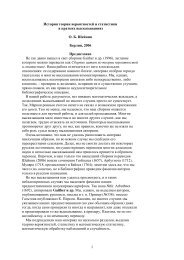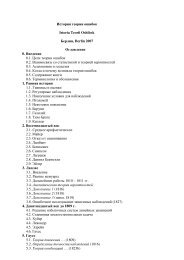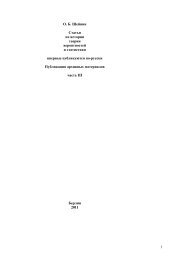phenomena. It is self-evident that any antagonism between these two branches of theessentially indivisible science of mass phenomena is out of the question. On the contrary,they most indispensably supplement one another. Romanovsky is one of the most productive<strong>Soviet</strong> scientists <strong>and</strong> the remoteness of his city from the old scientific centers does not hinderhis uninterrupted close ties with scientists the world over working in this sphere. It is difficultto name any considerable area in current mathematical statistics in whose developmentRomanovsky did not actively, <strong>and</strong>, moreover, weightily <strong>and</strong> authoritatively participate.The <strong>Soviet</strong> theory of probability also includes separate workers in other scientific centersof the nation (Zhuravsky in Leningrad, Persidsky in Kazan, et al).[8] In an overwhelming majority of the other branches of mathematics the Russian prerevolutionaryscience (excepting its separate representatives who embodied those exceptionsthat confirm the rule) lagged considerably behind their European counterparts, lacked its ownflavor <strong>and</strong> was even unable to follow the world science in a sufficiently civilized way. Weare glad to observe a flourishing of nearly all of these branches, but skeptics will perhaps beapt to explain this away as a peculiar illusion: Since nothing was available before, <strong>and</strong> atleast something is present now, it is easy to assume the something for very mush. In thetheory of probability the matter is, however, different: here we had much already in the prerevolutionaryperiod <strong>and</strong> what we have now we cannot compare with a blank space.Nevertheless, here also, as we see, the <strong>Soviet</strong> science wins this comparison totally <strong>and</strong>undoubtedly. The scientific accomplishments of the <strong>Soviet</strong> period are incomparably wider<strong>and</strong> much more versatile, but we see the main <strong>and</strong> decisive progress in the management ofscience which certainly explains the successes of the <strong>Soviet</strong> theory of probability. The prerevolutionarymathematics was unaware of scientific collectives working orderly <strong>and</strong> inconcord; nowadays, we have them.The pre-revolutionary mathematics stewed in its own juice, <strong>and</strong>, in spite of all itsaccomplishments, was barely able to influence the world science. The <strong>Soviet</strong> theory ofprobability rapidly secured one of the leading positions in the world science <strong>and</strong> achievedsuch an authority about which the pre-revolutionary science could not have even dreamt.Non-one can say that my statement is an exaggeration since it is completely based on facts. Itis a fact that the most prominent scientists the world over publicly recognize the authority<strong>and</strong> the influence of the <strong>Soviet</strong> stochastic school. It is a fact that in a number of cases foreignpublishers apply to <strong>Soviet</strong> authors when compilation of treatises <strong>and</strong> monographs onprobability is required <strong>and</strong> that before the Revolution there were no such cases. It is a factthat <strong>Soviet</strong> scientists were charged with delivering the leading plenary reports on the theoryof probability at the two latest international congresses of mathematicians (in 1932 <strong>and</strong> 1936)<strong>and</strong> that no such cases had happened at the congresses before the Revolution.Thus, if even before the Revolution the Russian theory of probability, owing to its specificweight, might have by right claimed to be a leading force in world science, the <strong>Soviet</strong> theoryof probability has not only totally confirmed this right <strong>and</strong> justified it even better. For us, it isno less important, however, that our branch of mathematics has exercised this right <strong>and</strong>continues to exercise it ever more persistently. The power necessary for this is certainlydrawn exclusively from the inexhaustible source of cheerfulness contained in our newSocialist culture.Notes1. {It is possible that Khinchin did not dare to mention sociology, an exclusive domain ofthe Marxist dogmas.}2. {The method of least squares is a peculiar field in that many leading mathematicians(for example, Chebyshev, Lévy, Fisher <strong>and</strong> Koomogorov) formulated unfounded or evenwrong statements about it. here, Khinchin indirectly <strong>and</strong> wrongly declared that the method
stood in need of the central limit theorem (in essence, of the ensuing normal distribution). Itis certainly true that it is best of all, in a definite sense, to secure observations whose errorsobey the normal law, but this is not necessary for justifying the method of least squares. Itwas Gauss, who, in 1823, provided the definitive substantiation of the method (perhaps lessconvincing for pure mathematicians).}3. {Many publications of that period were aimed at popularizing the contributions ofLaplace <strong>and</strong> Poisson which had been remaining scarcely understood.}4. {Obviously, large deviations from the appropriate mean value.}5. {Khinchin should have mentioned Markov right here, not only two pages later.}6. {Bachelier’s first publication appeared in 1900, cf. Kolmogorov’s essay of 1959 (§4),also translated in this book.}The Theory of 5. A.N. Kolmogorov. <strong>Probability</strong> <strong>and</strong> Its ApplicationsIn (Mathematics <strong>and</strong> Natural Sciences in the<strong>Soviet</strong> Union). Moscow, 1938, pp. 51 – 61 …[Introduction] The last two decades have been a period of rapid international growth <strong>and</strong>reconstruction of the theory of probability <strong>and</strong> of a further strengthening of its influence onthe physical, biological <strong>and</strong> technical investigations. The heightened attention to the theoryled to the establishment, for the first time ever, of a systematic international cooperationbetween specialists in this field. New ideas originating in one country therefore find aresponse in another one during the very next years, <strong>and</strong> sometimes even in a few months.<strong>Soviet</strong> mathematicians participated to a considerable extent in this lively <strong>and</strong> intensive work<strong>and</strong> in many directions they have formulated the main guiding ideas.True, for the theory of probability the matter for the <strong>Soviet</strong> science consisted not in gaining,for the first time, an honorary place in the international scientific work, but rather in keepingfor itself, in the situation of a sharply increased activity of foreign scientific schools, that firstplace which the works of Chebyshev, Markov <strong>and</strong> Liapunov firmly won for the Russianscience. During that preceding period, when general theoretical research in probabilitysomewhat fell into decay in Western Europe, the three Russian scholars deeply developed theclassical heritage of Laplace, Poisson <strong>and</strong> Gauss 1 .Actually, their investigations created that complete system of the classical theory ofprobability which now constitutes the main substance of the textbooks. However, concerningthe pre-revolutionary period, we may only speak about the leading position of the Russianschool with respect to the world science with a serious reservation. Whereas Chebyshev’sfindings were appreciated abroad a long time ago, Liapunov’s fundamental memoirs of 1900– 1901 containing the proof of the main limit theorem of the theory of probability remainedfor many years hardly noticed <strong>and</strong> Mises (in 1909) 2 <strong>and</strong> Lindeberg (in 1923) discoveredtheir results anew.The fate of Markov’s research devoted to the pattern of the course of r<strong>and</strong>om phenomena,now everywhere called the scheme of Markov chains, was still more sorrowful. He himselfonly dealt with his pattern theoretically, <strong>and</strong>, as an illustration, he considered the alternationof vowels <strong>and</strong> consonants in the text of {Pushkin’s} ! (Eugene Onegin). Onlyabout 1930 his results got widely known (<strong>and</strong> were partly rediscovered anew) <strong>and</strong> becamethe theoretical foundation for very general <strong>and</strong> important concepts of statistical physics. Thisexample concerning Markov chains is also connected with another feature of the prerevolutionaryRussian school, with its being exclusively directed to the solution of classicalproblems <strong>and</strong> detached from the newly originating requirements to probability theory fromother sciences.
- Page 4 and 5: [3] I bear in mind the well-known p
- Page 6 and 7: successes of physical statistics. B
- Page 8 and 9: classes of independent facts whose
- Page 10 and 11: distribution is a corollary of the
- Page 12 and 13: examine in the first place the curv
- Page 14 and 15: 12. According to Bortkiewicz’ ter
- Page 16 and 17: generality, the similarities taking
- Page 18 and 19: one on another, as well as the corr
- Page 20 and 21: is inapplicable because the right s
- Page 22 and 23: Instead, Slutsky introduced new not
- Page 24 and 25: abandoned in August 1936, but it is
- Page 26 and 27: last decades, mathematicians more o
- Page 28 and 29: charged with making the leading ple
- Page 30 and 31: motion and a number of others) are
- Page 34 and 35: Such new demands were formulated in
- Page 36 and 37: The addition of independent random
- Page 38 and 39: automatic lathes, etc. Here, the ma
- Page 40 and 41: 11. Kolmogorov, A.N. Grundbegriffe
- Page 42 and 43: period 1 and remained, until the ap
- Page 44 and 45: of the analytical tool rather than
- Page 46 and 47: with probability approaching unity,
- Page 48 and 49: logic. The ensuing vagueness in his
- Page 50 and 51: 2. Gnedenko, B.V. (1949), On Lobach
- Page 52 and 53: will be sufficient, although not ne
- Page 54 and 55: nlimk = 1P(| k (n) - m k (n) | > H
- Page 56 and 57: favorite classical issue as the gam
- Page 58 and 59: and some quite definite (not depend
- Page 60 and 61: influenced by a construction that a
- Page 62 and 63: P ij (1) = p ij (1) , P ij (t) =kP
- Page 64 and 65: 4.2d. Bebutov [1; 2] as well as Kry
- Page 66 and 67: are yet no limit theorems correspon
- Page 68 and 69: described, from the viewpoint that
- Page 70 and 71: conditional variance and determined
- Page 72 and 73: Romanovsky [45] and Kolmogorov [46]
- Page 74 and 75: Let S be the general population wit
- Page 76 and 77: Part 1. Russian/Soviet AuthorsAmbar
- Page 78 and 79: 2. On necessary and sufficient cond
- Page 80 and 81: Gnedenko, B.V., Groshev, A.V. 1. On
- Page 82 and 83:
52. ( (Mathematical Principl
- Page 84 and 85:
Kozuliaev, P.A. 1. Sur la répartit
- Page 86 and 87:
Obukhov, A.M. 1. Normal correlation
- Page 88 and 89:
30. Généralisations d’un théor
- Page 90 and 91:
22. Alcune applicazioni dei coeffic
- Page 92 and 93:
10. A.N. Kolmogorov. The Theory of
- Page 94 and 95:
Kuznetsov, Stratonovich & Tikhonov
- Page 96 and 97:
In the homogeneous case H s t = H t
- Page 98 and 99:
to such a generalization. He only s
- Page 100 and 101:
In the particular case of a charact
- Page 102 and 103:
as it is usual for the modern theor
- Page 104 and 105:
1. {The second reference to Pugache
- Page 106 and 107:
Smirnov, Romanovsky and others made
- Page 108 and 109:
determined the precise asymptotic c
- Page 110 and 111:
for finite values of N, M and R 2 .
- Page 112 and 113:
Mikhalevich’s findings by far exc
- Page 114 and 115:
Uch. Zap. = Uchenye ZapiskiUkr = Uk
- Page 116 and 117:
Khinchin, A.Ya. 43. Math. Ann. 101,
- Page 118 and 119:
7. DAN 115, 1957, 49 - 52.Pinsker,
- Page 120 and 121:
Anderson, T.W., Darling, D.A. (1952
- Page 122 and 123:
Statistical problems in radio engin
- Page 124 and 125:
observations for its power with reg
- Page 126 and 127:
securing against mistakes (A.N. Kry
- Page 128 and 129:
of the others, then its distributio
- Page 130 and 131:
In Kiev, in the 1930s, N.M. Krylov


